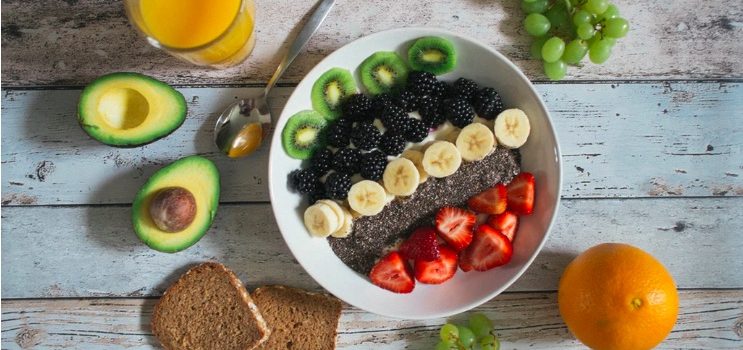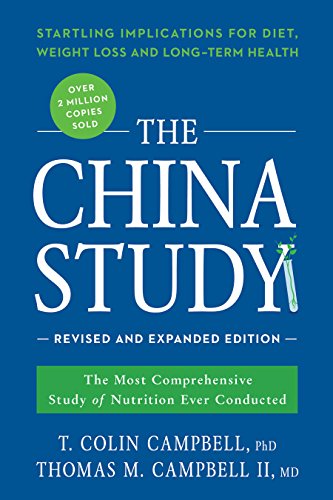

This article is an excerpt from the Shortform summary of "The China Study" by Colin Campbell. Shortform has the world's best summaries of books you should be reading.
Like this article? Sign up for a free trial here .
You know a whole foods, plant-based diet is good for you, but how do you make it work for you? Follow the 8 principles of the China Study diet.
The China Study diet is a way of eating that focuses on whole plant foods with the aim of preventing and reversing disease.
A way of eating made popular by The China Study, written by Dr. T. Colin Campbell and his son, Dr. Thomas M. Campbell, the China Study diet focuses on whole, plant-based foods. The Campbells aim to take the guesswork out of a healthy vegan diet by outlining eight key principles.
Background: The China Study Diet
In The China Study, T. Colin Campbell, Ph.D., and his son Thomas M. Campbell II, MD offer evidence that suggests that the foods we should actually be avoiding are animal-based. In hundreds of studies, eggs, cheese, milk, and meat have all been shown to increase your risk of everything from obesity and diabetes to cancer and autoimmune diseases.
They recommend avoiding animal foods entirely. The eight principles below provide the framework for this system.
The Eight Principles of the China Study Diet
Principle #1
Various nutrients work together to achieve health.
No single nutrient is responsible, on its own, for good health. The way food chemicals function in the body and the way they interact with each other are too complex to ever fully understand. The sum of all these chemicals working together is greater than the actions of each individual chemical.
This is why the “whole foods” part of the whole foods, plant-based diet is important. How nutrients are packaged together in food matters more than the specific nutrients themselves. This brings us to Principle #2.
Principle #2
Avoid supplements—get your nutrients from food, not pills.
Supplements are problematic for a variety of reasons. First of all, the whole concept of a supplement ignores Principle #1—it’s the whole food, not a particular nutrient, that provides the most benefit.
Additionally, supplements are poorly regulated, so you don’t really know what you’re getting when you buy them. They may have unforeseen side effects and some can cause harm. For example, many researchers caution against taking beta-carotene supplements because they’ve been shown to increase lung cancer risk.
Another problem is that supplements encourage people to eat poorly and “compensate” by taking pills.
Exceptions to Principle #2
Vitamin B12: The China Study diet doesn’t contain B12, which is found only in animal products. Supplements of this vitamin have been shown to be effective in resolving deficiencies and there’s no evidence they cause health problems.
Vitamin D: While we can usually get the vitamin D we need easily from the sun, some people living in northern climates won’t see enough daylight to meet their needs. Studies on the benefits of vitamin D supplements are inconclusive. Sunlight is still the best way to get your vitamin D.
Principle #3
Almost any nutrient you can find in animal-based foods, you can find in a healthier form in plant-based foods.
Plant foods have more of almost every nutrient, including fiber, vitamins, minerals, and antioxidants. Most animal foods lack these nutrients. In their place, they contain cholesterol and fat.
Animal foods do tend to have a little more protein than plant foods, but plant proteins are healthier.
Possible Exceptions to Principle #3
Nuts and seeds are high in fat. But these fats are healthier than animal fats and are accompanied by antioxidants.
Many dairy products are made low-fat using artificial processes. But this still leaves behind unhealthy proteins.
Many animal foods contain vitamin A, which most plant foods lack. But our bodies can easily make vitamin A from beta-carotene, found in plants.
Animal foods contain vitamin D, which plant foods don’t. But we can get all the vitamin D we need from sunlight. Further, vitamin D is toxic in high doses, so we’re in danger of getting too much from animal products.
Vitamin B12 is the only true exception. As detailed in Principle #2, consider a vitamin B12 supplement if you follow the China Study diet.
Principle #4
Genes alone don’t cause disease—we have considerable control over which genes are expressed.
Dormant genes, genes that aren’t expressed, have no effect on our health. Genes only affect us when they’re activated, and diet is one of the biggest triggers of gene activation.
As demonstrated by the cancer research discussed in the book, researchers can turn “bad” genes on and off by altering the amount of animal protein they give to mice.
The idea of dietary triggers explains why, in populations made up of people who share a genetic heritage, disease rates vary widely.
Further, genes evolve slowly, changing minimally, or not at all, over hundreds of years. But disease rates change at a much faster rate, sometimes in a period as short as a year. Therefore, we can’t blame changing genes for increasing disease rates.
In summary, genes give us dispositions, but they don’t dictate what diseases we’ll get.
Principle #5
Good nutrition can counter carcinogens.
As a society, we’re under the impression that carcinogens like DDT, Red Dye Number 2, and artificial sweeteners cause cancer (that is, when we’re not under the impression that genes cause cancer).
We like to blame carcinogens because, in some cases, they’re easier to avoid than whole food groups. But, like genes, carcinogens are often activated by diets high in animal protein.
Conversely, antioxidant-rich plant foods in the China Study diet can diminish the potency of carcinogens.
Principle #6
The same principles that prevent disease can reverse it.
The China Study diet can prevent heart disease, diabetes, and obesity. It’s also been shown to reverse these diseases.
There are some exceptions, of course. Autoimmune diseases are largely irreversible. Still, the China Study diet has been shown to slow the progress of even incurable diseases like Type 1 diabetes, rheumatoid arthritis, and multiple sclerosis.
Principle #7
Nutrition that prevents one disease is probably beneficial for health in general.
Regardless of how whole, plant foods function to reduce your risk of various diseases, they seem to reduce risk across the board. Therefore, if you know that the China Study diet is good for your heart, you can be pretty sure it’s also good for your brain, liver, kidneys, and nervous system.
Principle #8
Good nutrition works holistically with physical activity, mental and emotional health, and our environments.
Positive lifestyle changes work together and build off of one another to promote health. It jump-starts a cycle: Eating well gives us more energy. Having more energy makes it easier to exercise more. Exercising more promotes mental and emotional health. When we’re in a better mood, we eat healthier meals. Each lifestyle change reinforces the cycle of good health.
Eating the China Study diet is also good for the planet. It allows us to use less water, less land, and fewer resources. Growing plants also generates far less pollution than raising livestock. Consequently, eating what’s best for our physical, mental, and emotional health is also what’s best for the planet.
—-
With these principles in mind, let’s remind ourselves of just a few of the benefits of the China Study diet:
- Live a longer life
- Look and feel younger and more energetic
- Lose weight
- Lower cholesterol and blood pressure
- Prevent and reverse disease
- Reduce the need for expensive surgeries
- Decrease the chances that your child will develop an autoimmune disease
Use the eight principles of the China Study diet to transition into healthier eating patterns.
———End of Preview———

Like what you just read? Read the rest of the world's best summary of "The China Study" at Shortform . Learn the book's critical concepts in 20 minutes or less .
Here's what you'll find in our full The China Study summary :
- Why animal proteins (meat, milk) might cause cancer, diabetes, and other diseases
- Why the medical institution is structured to hide the truth about disease and food
- The precise diet you'll need to eat to live longer and feel happier






